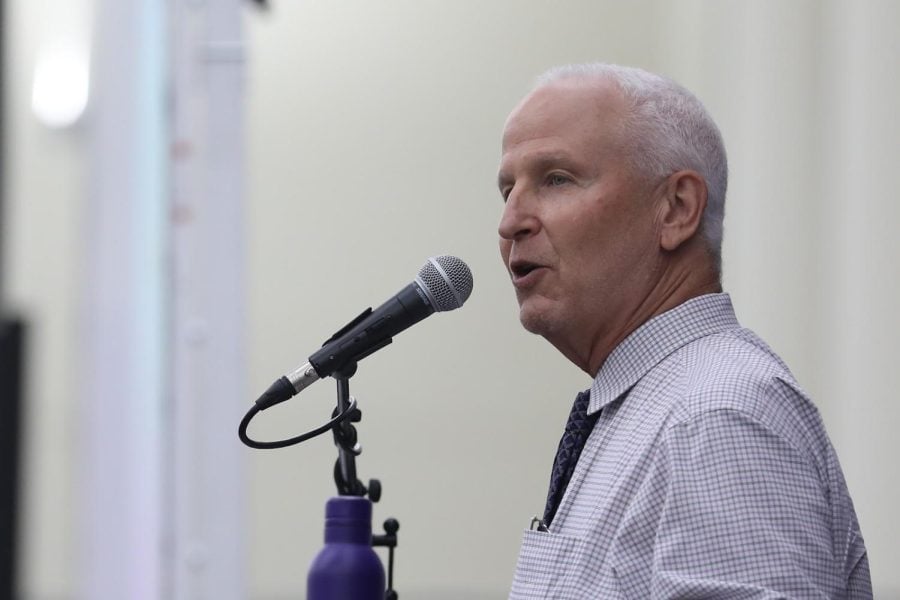Senior administrators discuss budget, hiring and CAPS during Faculty Assembly
Joshua Hoffman/Daily Senior Staffer
University President Morton Schapiro speaking at Wildcat Welcome. Schapiro, along with other senior administrators, discussed the University’s budget and hiring process among other issues at the Faculty Assembly’s first meeting of the 2021-22 academic year.
October 21, 2021
University President Morton Schapiro and Provost Kathleen Hagerty discussed Northwestern’s budget, hiring and Counseling and Psychological Services in Tuesday’s Faculty Assembly.
NU’s bicameral faculty governing body, which consists of the Senate and the Assembly, passes resolutions and recommendations about matters pertaining to campus life and hiring policy.
Faculty Senate president and molecular biosciences Prof. Robert Holmgren led the meeting, which opened with remarks from Schapiro and a presentation on COVID-19 updates from Vice President for Operations Luke Figora.
Schapiro said the University’s $14 billion endowment has rebounded after challenges posed by the pandemic.
“After a couple of lean years, we’ve been substantially in surplus now for several years in a row,” Schapiro said. “When we finally close the books on fiscal year ’21, there’ll be another very large surplus.”
He credited a massive fundraising effort, which he called one of the largest among U.S. universities. The “We Will” campaign raised more than $6 billion.
Given this budget surplus, a faculty member asked about understaffing across numerous departments at NU.
Hagerty said the University is aware of the problem and trying to address it. NU froze hires and salaries during the pandemic and only recently began hiring again, she said. She added that a larger national labor shortage has made hiring difficult.
“There are lots of openings, and this is a problem everywhere,” Hagerty said. “How to build that group back up is a challenge, not necessarily because of financial challenges, but actually just a challenge to literally hire people.
The salary freeze Hagerty mentioned has also prevented faculty salaries from keeping pace with inflation.
Schapiro said the University is actively trying to adjust staff salaries now that it has the funding.
“Our highest priority is … existing faculty and staff and to treat them in as equitable and generous a way as we can,” Schapiro said. “We have the resources now with the endowment, with the fundraising and with the budget surpluses to do that.”
In response to a question about library funding, Hagerty said the University is working on reallocating money to account for changing costs of materials.
Another faculty member asked Schapiro about COVID-19’s impact on student mental health and the plan to improve CAPS.
“There has been a plan, and we’ve actually implemented that plan,” Schapiro said. “We’ve increased their funding and increased their positions.”
He said wait times for psychological services decreased dramatically under CAPS’ new executive director, Garrett Gilmer, who assumed the role in February.
But these changes may not be enough to meet students’ needs. In April, Reform CAPS, a student group calling for changes to the University’s psychological resources, started posting on Instagram advocating for greater transparency and accountability, shorter wait times and a more diverse staff. The group has hosted events and raised awareness this fall.
Faculty also discussed bylaw amendments in the meeting, which was the first of the two held every year. The next meeting will be in Spring Quarter.
Email: [email protected]
Related Stories:
— Faculty Assembly discusses controversial amendment to bylaws


